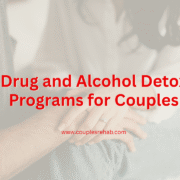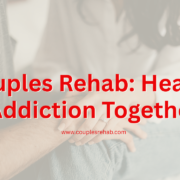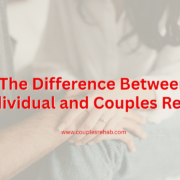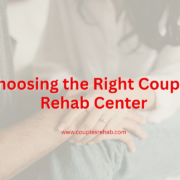A Path to Healing Together
When addiction affects a relationship, both partners face a unique set of challenges that can test even the strongest bonds. Yet, there’s hope in knowing that couples can not only survive addiction but emerge stronger through the recovery process. This guide explores the transformative journey of couples recovery, offering insights, support, and practical steps for healing together.
Addiction Treatment Helpline 888-500-2110
Understanding Addiction’s Impact on Relationships
Addiction rarely affects just one person. When substance use disorder enters a relationship, it creates ripple effects that touch every aspect of couples’ lives:
- Trust and Communication: Substance abuse often leads to broken promises, dishonesty, and communication breakdown. Many couples find themselves trapped in cycles of hurt and misunderstanding.
- Financial Stability: The cost of sustaining addiction can drain savings, create debt, and lead to job loss, putting immense strain on household finances and shared dreams.
- Emotional Intimacy: The walls built during active addiction can make emotional connection feel impossible, leaving both partners feeling isolated even when together.
- Family Dynamics: For couples with children, addiction complicates parenting and can create generational patterns that need addressing during recovery.
The Benefits of Recovering Together
While some treatment approaches separate couples during recovery, research shows that couples who heal together often experience better outcomes. Here’s why:
- Shared Understanding: Partners who undergo treatment together develop a deeper comprehension of addiction and recovery’s challenges.
- Unified Growth: Both partners learn healthy coping mechanisms, communication skills, and relationship tools simultaneously.
- Stronger Support System: Couples in recovery together can support each other through challenges, celebrating victories and navigating setbacks as a team.
- Higher Success Rates: Studies indicate that couples who attend rehab together often show improved relationship satisfaction and lower relapse rates.
Steps in the Couples Recovery Journey
1. Recognition and Acceptance
The path to recovery begins when both partners acknowledge the presence of addiction and its impact on their relationship. This crucial first step often involves:
- Honest conversations about substance use
- Recognition of enabling behaviors
- Acceptance of the need for professional help
- Commitment to change from both partners
2. Finding the Right Treatment Program
Selecting an appropriate couples rehab program is vital for success. Consider programs that offer:
- Specialized couples therapy approaches
- Individual and group counseling sessions
- Evidence-based treatment methods
- Family therapy options
- Aftercare planning and support
3. The Treatment Process
Effective couples recovery programs typically include several key components:
- Medical Detoxification: When necessary, supervised detox ensures safe withdrawal from substances.
- Couples Therapy: Specialized counseling addresses relationship dynamics, communication patterns, and shared triggers.
- Individual Therapy: Each partner works on personal growth and recovery goals.
- Group Support: Connecting with other couples in recovery provides community and shared learning opportunities.
4. Rebuilding Trust and Intimacy
Recovery offers couples the chance to rebuild their relationship on a stronger foundation:
- Learning healthy communication patterns
- Establishing new shared routines and rituals
- Practicing transparency and honesty
- Rekindling emotional and physical intimacy at an appropriate pace
5. Developing Relapse Prevention Strategies
Successful long-term recovery requires both partners to:
- Identify and manage triggers together
- Create emergency plans for high-risk situations
- Build a strong support network
- Maintain regular therapy or counseling sessions

Common Challenges and Solutions
Trust Building
- Challenge: Rebuilding trust after addiction can feel overwhelming.
- Solution: Practice consistent honesty, maintain transparency about whereabouts and activities, and celebrate small victories in trust-building.
Communication
- Challenge: Old communication patterns may resurface during stress.
- Solution: Learn and practice healthy communication tools, such as active listening and “I” statements.
Codependency
- Challenge: Unhealthy dependency patterns may persist in recovery.
- Solution: Work with therapists to establish healthy boundaries and individual identities while maintaining supportive partnership.
Creating a Sustainable Recovery Lifestyle
Long-term success in couples recovery involves:
- Shared Wellness Activities: Exercise, meditation, or hobby exploration together
- Regular Check-ins: Scheduled time to discuss recovery progress and relationship health
- Support Group Participation: Continuing involvement in recovery communities
- Stress Management: Learning to handle life’s challenges without substances
- Healthy Social Connections: Building relationships with other recovering couples
Supporting Your Partner While Maintaining Self-Care
Recovery requires balancing support for your partner with personal well-being:
- Set appropriate boundaries
- Maintain individual interests and friendships
- Practice self-care routines
- Seek personal therapy when needed
- Celebrate individual and shared achievements
Looking to the Future
Recovery is an ongoing journey, not a destination. Successful couples:
- Continue growing individually and as a couple
- Remain committed to open communication
- Stay connected to recovery support systems
- Plan for future challenges and opportunities
- Build new shared dreams and goals
Frequently Asked Questions
How long does couples rehab typically last?
Programs vary from 30 to 90 days, with many couples choosing extended care options. The exact duration depends on individual needs and progress.
Does insurance cover couples rehab?
Many insurance providers cover addiction treatment, including couples programs. Coverage varies by provider and policy. Professional treatment centers can help verify your benefits.
What types of therapy are used in couples rehab?
Common approaches include:
- Behavioral Couples Therapy (BCT)
- Cognitive Behavioral Therapy (CBT)
- Emotionally Focused Therapy (EFT)
- Family Systems Therapy
- Motivational Interviewing
How can we maintain recovery after treatment?
Success after treatment often involves:
- Following aftercare plans
- Attending support groups
- Continuing therapy
- Practicing healthy lifestyle choices
- Maintaining open communication
Ready to Begin Your Recovery Journey Together?
Taking the first step toward recovery is an act of courage and love. If you and your partner are ready to start your healing journey, help is available. Contact our team for a confidential consultation about our couples recovery programs.
- Phone: (888) 500-2110
- Email: info@couplesrehab.com
- Online: https://couplesrehab.com/contact/
Remember, recovery is possible, and couples who heal together often build stronger, more fulfilling relationships than ever before.
National Resources:
- Substance Abuse and Mental Health Services Administration (SAMHSA): SAMHSA is a federal agency that leads public health efforts to advance the behavioral health of the nation. They offer a wealth of resources, including a national helpline and treatment locator.
- SAMHSA National Helpline: 1-800-662-HELP (4357) (24/7, 365 days a year)
- Website: https://www.samhsa.gov/
- Treatment Locator: https://findtreatment.gov/ (This tool helps you find treatment facilities near you.)
- National Institute on Drug Abuse (NIDA): NIDA is part of the National Institutes of Health (NIH) and focuses on research related to drug abuse and addiction. They also offer resources and information for the public.
- Website: https://www.drugabuse.gov/
- National Institute of Mental Health (NIMH): NIMH is another part of the NIH and focuses on research and information related to mental health.
- Website: https://www.nimh.nih.gov/
- Centers for Disease Control and Prevention (CDC): The CDC provides information and resources on various health topics, including mental health and substance abuse.
- Website (Mental Health): https://www.cdc.gov/mentalhealth/ * Website (Substance Use): https://www.cdc.gov/vitalsigns/substance-use/index.html
- The National Suicide Prevention Lifeline: Provides 24/7, free and confidential support for people in distress, as well as prevention and crisis resources for you or your loved ones.
- Phone: 988 (This new, easy-to-remember number connects to the existing Lifeline.)
- Website: https://988lifeline.org/
- The Veterans Crisis Line: Provides 24/7 confidential support for Veterans and their families.
- Phone: 988 (then Press 1)
- Text: 838255
- Website: https://www.veteranscrisisline.org/
Other Helpful Resources:
Website: https://www.usa.gov/
MentalHealth.gov: This website provides information about mental health, including disorders, treatment options, and how to get help.
Website: https://www.mentalhealth.gov/
USA.gov: This is the U.S. government’s official web portal, and you can find information and resources on a variety of topics, including health and human services.
Disclaimer: This article is for informational purposes only and should not be considered medical advice. Please consult healthcare professionals for specific treatment recommendations.











